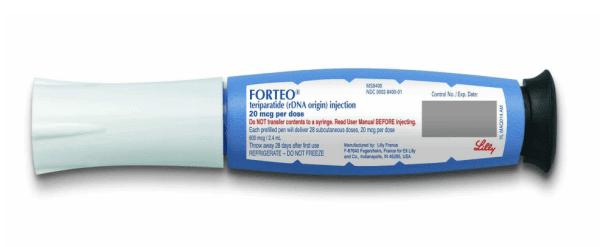Teriparatide Disease Interactions
There are 6 disease interactions with teriparatide.
- Hyperparathyroidism
- Malignancy
- Metabolic bone disorder
- Orthostatic hypotension
- Renal impairment
- Urolithiasis
Parathyroid hormone/analogs (applies to teriparatide) hyperparathyroidism
Major Potential Hazard, Moderate plausibility. Applicable conditions: Hypercalcemia
Patients known to have an underlying hypercalcemic disorder, such as primary hyperparathyroidism, should not be treated with parathyroid hormone and its analogs because of the risk of exacerbating hypercalcemia.
Parathyroid hormone/analogs (applies to teriparatide) malignancy
Major Potential Hazard, Moderate plausibility. Applicable conditions: Paget's Disease, Neoplasm of Bone
Parathyroid hormone and its analogs should not be used in patients who are at increased baseline risk for osteosarcoma. These agents should only be used if the potential benefits are considered to outweigh the potential risks. Monitor these patients according to clinical guidelines. Patients with bone metastases or a history of skeletal malignancies should not be treated with these agents.
Teriparatide (applies to teriparatide) metabolic bone disorder
Major Potential Hazard, Moderate plausibility. Applicable conditions: Paget's Disease, Vitamin D Deficiency, Hungry Bone Syndrome, Osteodystrophy
The use of teriparatide in patients with metabolic bone disease, other than osteoporosis is not recommended by the manufacturer.
Teriparatide (applies to teriparatide) orthostatic hypotension
Moderate Potential Hazard, Moderate plausibility.
There have been reports of transient episodes of symptomatic orthostatic hypotension with the use of teriparatide in short-term clinical pharmacology studies. Caution is recommended when using this agent in patients at risk.
Teriparatide (applies to teriparatide) renal impairment
Moderate Potential Hazard, Moderate plausibility. Applicable conditions: Renal Dysfunction
No pharmacokinetic differences were identified in patients with mild or moderate renal impairment after a single dose of teriparatide. In patients with severe renal impairment, the AUC and half-life of teriparatide were increased by 73% and 77%, respectively. Care should be exercised in patients undergoing dialysis for chronic renal failure as no studies have been performed in this patient population.
Teriparatide (applies to teriparatide) urolithiasis
Moderate Potential Hazard, Moderate plausibility. Applicable conditions: Nephrolithiasis
Teriparatide should be used with caution in patients with active urolithiasis. If active or pre-existing hypercalciuria is suspected, measurement of urinary calcium excretion should be considered because of the potential to exacerbate urolithiasis in these patients.
Switch to professional interaction data
Teriparatide drug interactions
There are 6 drug interactions with teriparatide.
More about teriparatide
- teriparatide consumer information
- Check interactions
- Compare alternatives
- Pricing & coupons
- Reviews (175)
- Side effects
- Dosage information
- Patient tips
- During pregnancy
- Drug class: parathyroid hormone and analogs
- Breastfeeding
Related treatment guides
Drug Interaction Classification
| Highly clinically significant. Avoid combinations; the risk of the interaction outweighs the benefit. | |
| Moderately clinically significant. Usually avoid combinations; use it only under special circumstances. | |
| Minimally clinically significant. Minimize risk; assess risk and consider an alternative drug, take steps to circumvent the interaction risk and/or institute a monitoring plan. | |
| No interaction information available. |
See also:
Further information
Always consult your healthcare provider to ensure the information displayed on this page applies to your personal circumstances.


